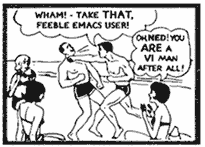CodeBlock said:How do you say some of the internet/*nix derived words, like "GUI" and "regex"... Here's some of mine:
/usr => 'slash you ess are',
/var => 'slash var',
/etc => 'slash e tee see',
vi => 'vee eye',
vim => 'vim' (just like it looks),
regex => 'reg ex' (reg like register),
fstab => 'eff ess tab',
gnu => 'gee enn you',
sudo => I mix between 'so do' and 'sue dough'
It's it short for "super user do"? I pronounce it as above, but it should probably be pronounced as the English verb "do".sudo
=> 'sue dough' or 'soooh dough' (again depending on the audience)

phoenix said:I've never understood pronouncing the G in GNOME. It's not like it's some bizarre, alien word. It spells out a real English word. Why not pronounce it like that word?
You may be right, but I think most people read 'sudo' as a new word (rather than an abbreviation/contraction) that looks an awful lot like a certain Japanese martial art that involves lots of throwing other people around. And therefore pronounce it as such.fronclynne said:It's it short for "super user do"? I pronounce it as above, but it should probably be pronounced as the English verb "do".
saxon3049 said:denny - I haven't had the pleasure of knowing any one from tiwan but I was told that in schools children are tought English to a very high standard and most people can speak English exceptionally well is this true or only true for the good schools?
Most of th' older references (some edition of the O'reilly book on unix & the ever valuable Operating Systems by Harvey Deitel) I have seen refer to it as the "visual interface" for ex.phoenix said:Interesting how many people pronouce "vi" as two separate letters. Is there a historical reason for that?
494757 -r-xr-xr-x 6 root wheel 337160 Aug 23 16:21 /usr/bin/ex
494757 -r-xr-xr-x 6 root wheel 337160 Aug 23 16:21 /usr/bin/viDutchDaemon said:"cash", with a slightly longer vowel.
fronclynne said:Most of th' older references (some edition of the O'reilly book on unix & the ever valuable Operating Systems by Harvey Deitel) I have seen refer to it as the "visual interface" for ex.
Code:494757 -r-xr-xr-x 6 root wheel 337160 Aug 23 16:21 /usr/bin/ex 494757 -r-xr-xr-x 6 root wheel 337160 Aug 23 16:21 /usr/bin/vi
